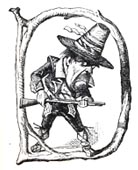Your loved land lay beneath a scalding sky
Where time itself solidifies to rock
That whitewigged rivers swear into the dock
To spill its guts on how things come to die.
Your questions even made it tell us why.
How can the mayfly ear know stones' own talk
That does not understand the soul in hock
To lives beyond itself the hour may buy?
And yet you moaned the minutes of the lives
That pressed the clay to purpose, seeing broken
All the bluebrushed bowls, the careful knives,
The vanquished bone or daisytwisted token
Vanished boys bragged to their grinning wives --
When you were what they wrote, now to be spoken.
November . 2000.
Dennis notes:
Loren Eiseley was an archaeologist who dug mostly in the western U.S., one of a few whose work I've followed "rather more or less" (with Dart, Broom, Lorenz, Leakey, Leakey, and Leakey). He also wrote at least three slim volumes of poems he insisted were not to be published, but his wife sneaked them to us, the last posthumously (thank her; they're worthy).
His books of poetry are:
Notes of an Alchemist (1972)
The Innocent Assassins (1973)
All the Night Wings (1978, posth.)
Dear Loren
For more information on Loren Eiseley, please click here.

Dennis M. Hammes
A polymath and man of many talents, Dennis Hammes is also a prolific writer of many forms of verse, particularly the haiku and sonnet forms.
Dear Loren is the envoy
(traditionally the introductory sonnet ) to the third sequence of Dennis' epic series which is loosely based on the legendary Orphic trilogy. The series
of sonnets comprises:
Eurydice
The Women of Thrace
The Singing Head
and parallels the story of the trials of Orpheus but within a landscape of contemporary events.
To date there are over 900 sonnets in this series with more on the drawing board.
the Revivalist

Dennis has made available to all serious students of poetry - his book
Prosody (in PDF form and html), illustrated fully with his own examples.
Two brief extracts from the text:
Poetry sings of the things that were, the things that are, and the things that could be. If it only sings of things the way it wants them to be, it wastes its time, because the reader wants them to be some other way, and poetry is not a particularly convincing platform for argument.
......
For far too many decades, Wordsworth is "quoted" in Literature and Creative Writing "courses" as "excuse" for the fact that the undisciplined poetaster slobbers all over the page, or cries to the skies, or screeches, and indeed does anything but produce a lyric. The offending passage is this:
Poetry is the spontaneous overflowing of powerful emotion.
What he said (in the Preface to Lyrical Ballads, coauthored with Coleridge) is quite its opposite:
Poetry is the spontaneous overflowing of powerful emotions, reflected in tranquillity. And no one can be said to have had a powerful emotion, save that he had also thought long and deeply.
...........
You will need to download Acrobat reader to access the PDF file.
Please click on the Get Acrobat Reader icon.
Dennis can be contacted here.
